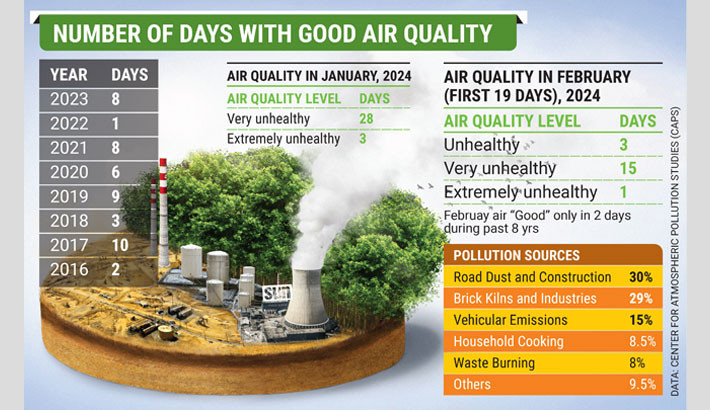
The residents of Dhaka city have not experienced any clean air in the past 50 days of this year due to a high level of air pollution witnessed in recent months.
The air pollution level in the capital poses a significant health risk for many years to come unless environmental control measures are effectively implemented.
The densely populated city experienced the highest level of air pollution in February of this year compared to the last eight years, according to the Center for Atmospheric Pollution Studies (CAPS) of Stamford University.
Residents of the city experienced only two days of good air quality in February 2017, and for the past six years, February has not seen good air quality.
Among the 19 days of February, the air quality was unhealthy on three days, very unhealthy on 15 days, and extremely unhealthy on one day.
In January, the air quality was very unhealthy for 28 days and extremely unhealthy for three days.
Dhaka city has not witnessed good air in January in the last eight years.
The city experienced good air only on eight days in 2023, one day in 2022, eight days in 2021, six days in 2020, nine days in 2019, three days in 2018, 10 days in 2017, and two days in 2016.
Prof Dr Ahmad Kamruzzaman Majumder, chairman of the Environmental Science department of Stamford University and chairman of CAPS, told the Daily Sun the highest level of air pollution in Dhaka usually occurs in January, followed by February and December every year.
He said 57% of air pollution happens during the winter season (November-March), while 43% occurs in the monsoon or pre-monsoon period in the capital city.
Air pollution in the capital city was the highest in 2023 within the last eight years.
In Bangladesh, the Air Quality Index (AQI) is determined by five criteria pollutants: Particulate Matter (PM10 and PM2.5), NO2, CO, SO2, and Ozone (O3). The primary causes of pollution in the country include vehicular emissions, industrial activities, brick kilns at construction sites, and the accumulation of dust from various sources.
Engineer Abdus Sobhan, president of the Environment and Climate Change Movement, said,
“The government is not addressing the root causes of air pollution. City corporations, WASA, and other organisations engage in prolonged road and street construction projects, during which workers leave sand and brickbats exposed on the roads, leading to the random mixing of dust particles with the air.”

